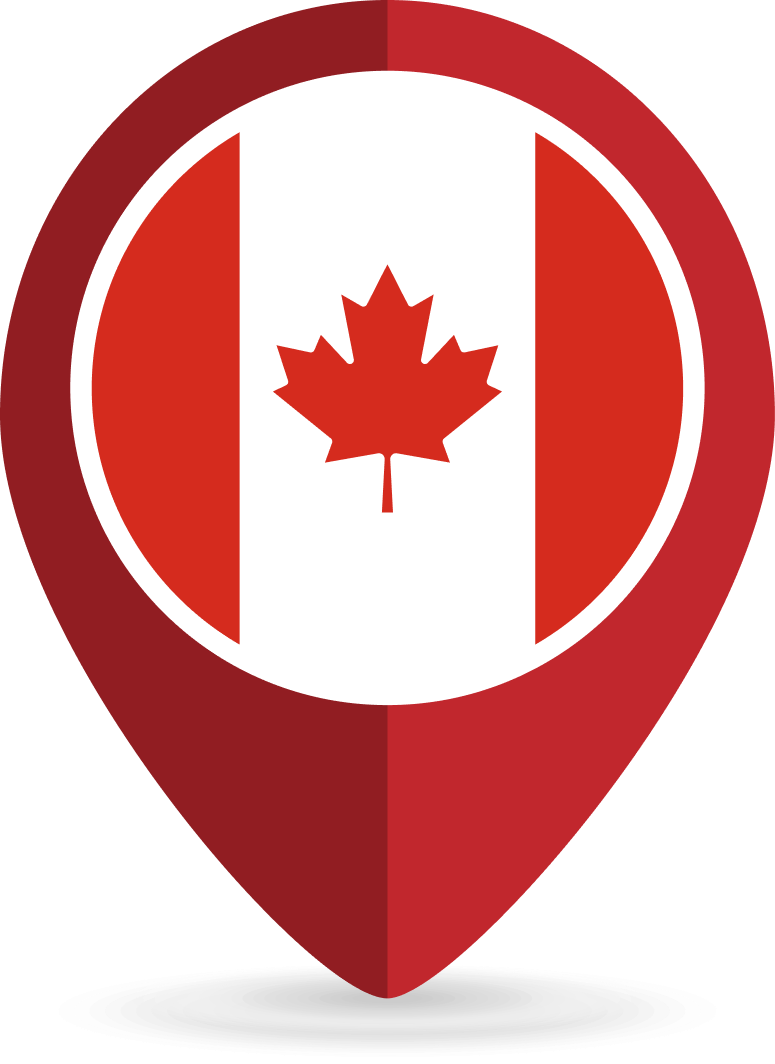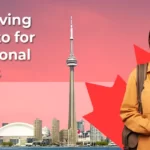Canada Student Visa Fees And Requirements For Indian Students
Canada has been a welcoming destination for a steady stream of students from India. While securing admission to prestigious Canadian universities demands outstanding academic achievements, the gateway to your educational aspirations is through a Study Permit.
When your academic, professional, or vocational aspirations lead you to a university, college, or educational institution in Canada, a Study Permit becomes your passport to learning. This permit isn’t issued in advance but rather upon your arrival in Canada, ensuring that your journey to knowledge aligns seamlessly with your arrival. However, before you set foot in this land of opportunities, you’ll need to navigate the path of acquiring a Temporary Resident Visa, which is thoughtfully provided by the Canadian High Commission and facilitated by the Visa Application Centers, managed by VFS Global Services.
In this article, we’re here to guide you through the intricate process, from understanding the prerequisites for a Canada student visa to the essential documents required for securing your Study Permit, along with a detailed look at Canada visa fees for Indian students. Because behind every document and form, there’s a student’s dream and determination, a future waiting to unfold in the vibrant classrooms and diverse landscapes of Canada.
Your educational voyage begins with a single step – and the Study Permit is that crucial step in your journey to knowledge and growth. Let’s explore the path together, including the vital aspect of Canada visa fees for Indian students.Your educational voyage begins with a single step – and the Study Permit is that crucial step in your journey to knowledge and growth. Let’s explore the path together, including the vital aspect of Canada visa fees for Indian students.
Who Needs A Canada Student Visa?
Canada, with its world-class education system, is a magnet for international students looking to expand their horizons. However, not everyone requires a Canada Student Visa. Let’s unravel the details.
All international students wishing to study in Canada who require a visitor visa or an Electronic Travel Authorization (eTA) to enter the country must secure a Canada Student Visa and Study Permit. This permit, important to note, doesn’t grant you entry into Canada; it’s your key to pursuing your educational dreams within its borders. It’s typically paired with a visitor visa or eTA, which, in turn, allows you to embark on your studies.
- If your study program lasts less than 6 months, you only need a Canada visitor visa or eTA, provided you can complete the program in that timeframe.
- A study permit is required for programs lasting more than 6 months.
- Exceptions include family or staff members of foreign representatives accredited by Global Affairs Canada and citizens of other countries with Registered Indian Status in Canada.
In summary, if your intended duration of study in Canada exceeds 6 months, you must obtain a Canada Student Visa.
The processing time for a Canadian study visa typically takes about 6 weeks. Plan accordingly as you embark on your educational journey in Canada.
Canada Student Visa for Indian Students - Key Documents
Study Permit:
- Issued by IRCC (Immigration, Refugees, and Citizenship Canada).
- Authorizes Indian nationals to study at a Canadian educational institution during their program.
- Contains conditions, including travel restrictions within Canada and departure requirements.
Temporary Resident Visa (TRV):
- An official counterfoil document issued by a visa application center in India.
- Placed on your valid passport, indicating that you meet the study visa requirements for admission to Canada as a temporary resident (Indian student).
- Informally known as a visitor or tourist visa.
- May be issued for single or multiple entries to Canada.
Electronic Travel Authorization (eTA):
- A new entry requirement for visa-exempt foreign nationals traveling to Canada.
- Allows Canada to screen travelers before their arrival.
- Valid for five years or until your passport expires.
These documents collectively facilitate the process for Indian students pursuing their education in Canada, ensuring they meet necessary requirements and have the authorization to study in the country.
How To Check The Canadian Student Visa Eligibility
To apply for a Canadian student visa as an Indian national, you must ensure you meet the following criteria:
- Be a Fully Vaccinated Traveler.
- Comply with Canada’s vaccination requirements.
- Enrollment at a Designated Learning Institution.
- You must be accepted by a recognized educational institution in Canada.
- Sufficient Funds.
- Demonstrate that you have enough financial resources to cover your tuition fees, living expenses, and return transportation.
- No Criminal Record.
- Provide proof of a clean criminal record.
- Good Health.
- Undergo a medical examination if required and maintain good health.
- Prove Your Intent to Leave.
- Convince the immigration officer that you’ll return to your home country when your study permit expires.
Requirements for Fully Vaccinated Travelers to Enter Canada:
To ensure a hassle-free entry into Canada as a fully vaccinated traveler, you’ll need to meet specific requirements. Whether you’re arriving via land, air, or sea, make sure you have the following items readily available for review by government officials at the border:
- ArriveCAN Receipt:
- Your ArriveCAN receipt must display the letter A, I, or V beside the vaccinated traveler’s name.
- Proof of Vaccination:
- You should have proof of vaccination uploaded into ArriveCAN, either in its original digital form or as a paper copy.
- Prepare for Arrival Testing:
- Be ready for arrival testing if you are selected for it.
- Valid Travel Document:
- Ensure you have a valid travel document, such as a passport, duly entered into ArriveCAN.
These requirements are essential to ensure a smooth and efficient entry into Canada as a fully vaccinated traveler. Please note that land border crossings may not provide WiFi access for travelers, so having the necessary documents in a tangible form is crucial.
Enrollment at a Designated Learning Institution:
To apply for a study permit, you must have an acceptance letter from a designated learning institution. A designated learning institution is a school authorized by a provincial or territorial government to admit international students. It’s important to note that while all primary and secondary schools in Canada host international students, they may not be included in this list.
If you plan to pursue post-secondary education, it’s crucial to ensure that your chosen institution is on the approved list. If the institution you’re studying at loses its designated learning institution status after you’ve obtained your study permit, you can continue your program until your current permit expires. However, when it comes time to renew your study permit, you should only do so if you enroll at a designated learning institution.
Sufficient Funds Requirement:
To meet the requirements for a Canadian student visa, you must demonstrate that you possess adequate financial resources to cover the following:
- Tuition Fees: You must have the means to pay for your educational expenses.
- Living Expenses: You should have the financial capacity to support your day-to-day living costs while in Canada.
Return Transportation: You need to show that you can afford the return transportation for both yourself and any accompanying family members should you decide to leave Canada.
Canada Student Visa Requirements for Indian Students:
As you prepare for your Canadian student visa application, it’s essential to gather the required documents. Here’s a list of the key documents you need for the process:
Primary Requirements:
- Proof of Acceptance: An acceptance letter from a Canadian university or institution.
- Proof of Identity: Valid identification documents.
- Visa Office Instructions: Any specific instructions provided by the visa office.
- Proof of Financial Support: Evidence of your financial ability to cover tuition fees, living expenses, and return transportation.
- Medical Examination Certificate: If required, a certificate confirming your medical fitness.
Additional Supporting Documents (may be required):
- Letter of Explanation: An explanatory letter outlining the purpose of your study in Canada.
- Guaranteed Investment Certificate: If applicable, documents related to investments.
- Quebec Acceptance Certificate (CAQ): Required for students planning to study in the province of Quebec.
- Custodian Declaration: For minor students, a declaration confirming the custodian’s responsibility.
These documents are crucial to ensure a smooth and successful application process for your Canadian student visa. Be sure to check with the official Canadian government website or the nearest Visa Application Center for the most up-to-date and detailed information.
Guaranteed Investment Certificate (GIC): Meeting Financial Requirements
To meet the financial requirements for your Canadian student visa, you’ll need approximately CAD 10,000 per year, excluding tuition fees, to cover your living expenses. This financial criterion can be satisfied by investing in a participating GIC and providing proof of tuition payment.
Participating Canadian financial institutions, including Scotiabank, ICICI Bank Canada, HSBC, and others, offer GIC programs that meet the criteria set by Citizenship and Immigration Canada. If your chosen bank or GIC doesn’t align with these specific criteria, you may not be eligible to apply through the Student Direct Stream.
This GIC requirement is an essential part of demonstrating your ability to financially support yourself while studying in Canada, ensuring you can comfortably cover your living expenses during your academic journey. Be sure to verify the latest financial requirements and participating institutions when preparing your student visa application.
How To Apply For Canada Student Visa For Indian Students Online
Canada, a North American gem, offers an abundance of opportunities for international students. With its famous landmarks, rich culture, and diverse outdoor experiences, it’s a top destination for education.
Registering Your IRCC Secure Account:
Before you initiate your Canadian student visa application online, you’ll need to create an IRCC secure account.
Step 1 – Prerequisites for Online Application:
Before you begin the online application process, ensure you have the following essentials:
- Scanner or Camera:
- You’ll need access to a scanner or a camera to create electronic copies of your required documents.
- Valid Credit Card or Debit Card:
- You should have a valid credit card or debit card for payment purposes during the application process.
Step 2: Read the Instruction Guide:
Reading the instruction guide is a crucial step in your application process. Even if you choose to apply online, it’s strongly recommended to carefully review the instruction guide before proceeding with your application. This guide serves as your comprehensive resource, offering valuable insights into how to complete each field on the application form accurately.
Step 3: Prepare Your Answers for the Online Tool:
Before you proceed with the online application, it’s important to prepare your responses to the questions that will be presented in the online tool. These questions are a crucial part of the application process, and your answers will be used to create a personalized document checklist tailored to your specific situation.
Step 4: Know the Canada Study Visa Fees For Indians:
Understanding the fees associated with your Canada study visa application is crucial. The processing fees are a mandatory part of your application, and it’s essential to be aware of the costs involved. Here are some key points to consider:
- Processing Fees: The processing fees are required to be included with your application. They cover the cost of processing and assessing your application. Make sure to check the most current fee structure, as fees may change over time.
- Biometric Fees: If you or your family members are required to provide biometric information as part of the application, the biometric fee should be paid simultaneously with the processing fee. This is typically done using the same payment method to avoid delays in your application process.
- Inclusion of Family Members: If you plan to include family members in your application, the processing fees will typically cover each individual included in the application. It’s important to be aware of the fee structure for dependents.
- Payment Method: Ensure that you have a valid and accepted payment method, whether it’s a credit card or another form of payment, to cover the required fees.
- Local Currency: Depending on your location, you may be required to pay the fees in the local currency, such as Indian Rupee. It’s important to check the specific payment instructions to ensure compliance with the local payment regulations.
Being well-informed about the fees and payment process is essential to avoid delays in your application and to ensure that your financial obligations are met promptly. Make sure to check the official website for the most up-to-date fee information before submitting your application.
Third-party Fees: It’s important to be aware that in addition to the processing and biometric fees, there may be third-party fees associated with your Canada study visa application. These fees are often specific to certain services or requirements, and they should be paid directly to the relevant third parties. Here are some common examples:
- Medical Exams or Medical Certificates
- Police Certificates
- Language Testing
- Services at a Visa Application Center
Biometrics Fee: In most cases, a biometrics fee should be paid when you submit your application. The biometrics fee covers the cost of collecting fingerprints and digital photos, which are essential for identity verification. It’s important to check whether biometrics are required for your application and to pay the fee accordingly.
Step 5: Create Your Online Account or Sign In:
To initiate your Canada study visa application online, you must create an online account or sign in if you already have one. This account will serve as your primary platform for managing your application. Here’s what you need to know:
- Payment of Fees
- Application Submission
- Application Status
If you require an eTA or visitor visa in addition to your study permit, the immigration authorities will typically issue these documents automatically alongside your study permit. There’s no need to submit a separate application or pay an additional fee for these documents.
Canada visa fees for indian students
| Types of Canada Student Visa |
Description |
| Study Permit | A Study Permit is a Canada Student Visa provided to students that allow them to stay in the country for the duration of their course at a Canadian University. It is basically a normal student visa! |
| Student Direct Stream Program | This program is designed to fast-track the processing of study permits for students from certain countries. |
| Quebec Acceptance Certificate | This is required for international students who wish to study at Universities in Quebec. |
| Visitor Visa or Electronic Travel Authorization (eTA) | Suppose an Indian student wants to study in Canada for less than 6 months – In that case, they will only need a Visitor Visa or an Electronic Travel Authorization (eTA) instead of a Study Permit. |
What Is The Study Visa Processing Times For Indian Students?
If you are an Indian national applying for a study permit in Canada, you have the opportunity to expedite your application processing through the Student Direct Stream (SDS). Here are some key points to keep in mind regarding processing times:
Biometrics: To ensure faster processing, it’s essential to provide your biometrics as soon as possible. Biometrics involve the collection of your fingerprints and digital photos, and providing them promptly can help streamline the process.
Eligibility Criteria: Meeting all the eligibility criteria requirements for your Canada study visa is crucial for expediting your application. Ensure that you have all the necessary documents and meet the eligibility requirements to avoid delays.
What to do after Applying for Canada Student Visa?
Once you’ve applied for a Canada student visa, there are several steps to follow in case your application is approved. If you applied for your Canada student visa from outside Canada, here’s what you need to do:
- Receive the Letter of Introduction: After your application is approved, you will receive a Letter of Introduction. This letter is crucial and needs to be brought with you.
- Present Documents to Border Services Officer: When you arrive in Canada, you will need to show the Letter of Introduction to a border services officer. Your Canada study permit will be issued based on this letter. Additionally, you may receive an Electronic Travel Authorization (eTA) or a Visitor Visa, depending on your country of origin.
- Required Documents: You will need to present the following documents to the border services officer:
- Passport
- Letter of Introduction
- Acceptance letter from your university or college
- Any reference letters as instructed by the visa officer
- Electronic Travel Authorization (eTA) or Visitor Visa
- Financial documents demonstrating your ability to cover tuition and living expenses
- Medical test reports, if required
Demonstrate Ties to Home Country: It’s essential to convince the immigration officer that you have strong ties to your home country and that you intend to leave Canada upon completing your studies. This can include demonstrating connections to your home country through family, property, or employment.
Intakes in Canada for University and College Admissions:
Canada offers multiple intakes for university and college admissions to accommodate different academic schedules and preferences. These intakes are:
- Fall Intake (September-December/January): The Fall Intake is the most popular intake for admission to Canadian universities. It typically starts in September and runs through December, with some programs extending into January.
- Winter Intake (January-May): The Winter Intake serves as an extension of the Fall Intake and typically runs from January to May. While it offers a fair selection of courses, it may not be as extensive as the Fall Intake. This intake is suitable for students who may have missed the Fall Intake or prefer to start their academic journey in the new year.
- Spring/Summer Intake (May-August): The Spring/Summer Intake is the most limited in terms of course offerings. It usually spans from May to August and provides a smaller number of courses.
Canadian SIM Card for Indian Students:
For Indian students planning to study in Canada, staying connected is essential. You can make the transition smoother with a Canadian SIM card from CanadianSIM. Here’s what you can expect from their $40 plan, which includes 40 GB of data:
- No Contract SIM:
- Unlimited Canada Wide Calls:
- Unlimited Local & International Text Messaging (SMS):
- No Set Up Fees
- Caller ID & Voicemail
In addition to these benefits, CanadianSIM offers free home delivery in India, making it even more convenient for Indian students preparing for their journey to Canada. Stay connected effortlessly with reliable SIM card services.
Related Posts



















